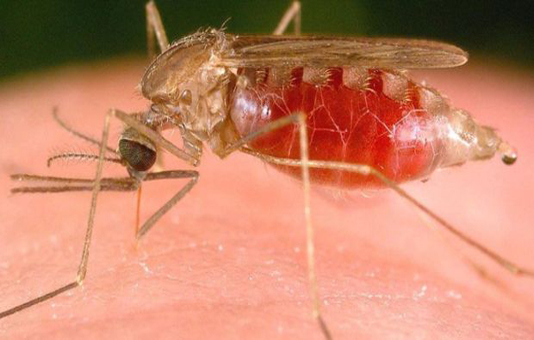EL TUCUCO, Venezuela, July 7, 2019 (BSS/AFP) – The sweltering heat of the
Venezuelan forest makes no difference to Jose Gregorio, who trembles with a
cold chill. “I have pain everywhere, fever,” he stammers.
Gregorio has the classic symptoms of malaria, a disease eradicated years
ago among his Yukpa indigenous people, but it’s back with a vengeance all
across crisis-struck Venezuela.
“He had sore joints and then started vomiting, and it’s been four or five
days since he’s eaten anything,” says his worried wife Marisol.
Their four-month-old baby babbles beside his father on the bed.
“The baby and I also had malaria,” says Marisol. “Before, that was not the
case here, there was only chikungunya and dengue, malaria came back here last
year.”
She doesn’t bat an eyelid at the mention of either of the other mosquito-
borne viruses, whose spread has been fueled by the collapse of Venezuela’s
health system.
“Here” is El Tucuco, a small village at the foot of the mountains that form
the border with Colombia, a three-hour drive from Maracaibo in Venezuela’s
western Zulia state.
With 3,700 people, El Tucuco is the Yukpas’ “capital” and malaria is
rapidly making its presence felt here as in the rest of Venezuela — a
country that could once boast of being the first to have eradicated the
disease in 1961.
– ‘Pandemic’ –
There are no official statistics on malaria’s reach into El Tucuco, nor on
the number of deaths it causes.
But from his consulting room at the Catholic Mission, Dr Carlos Polanco is
seeing a developing crisis.
“Out of 10 people who are tested for malaria in the village laboratory,
four to five come out with a positive test. This is an alarming figure.”
Brother Nelson Sandoval, a Capuchin friar who presides over the mission,
adds: “Before entering the order, I already knew this community and I had
never seen a case of malaria. Today we are in the middle of a pandemic.”
El Tucuco is affected by Plasmodium vivax, the most geographically
widespread malarial species. The more lethal Plasmodium falciparum strain is
prevalent in the Amazonian regions of southeastern Venezuela.
According to Sandoval and Polanco, the reason for malaria’s sudden
virulence in El Tucuco is simple: once-regular fumigation missions by the
Venezuelan government stopped.
“And as the population of mosquitos increased, cases exploded,” said
Polanco.
Added to this is the malnutrition that weakens resistance to the disease, a
new phenomenon since the economic crisis took hold at the end of 2015.
“Before, it was possible to vary one’s diet, but with inflation the Yukpa
cannot afford it,” instead making do with what they can grow, like cassava
and plantain, according to Polanco.
Rosa, 67, knows all about malnutrition. Lying on the floor of her house,
she is battling malaria for the third time. “The doctor weighed me yesterday
— 37 kilograms. I was 83 kilos before.”
A report published in British medical journal The Lancet in February warned
of an epidemic of malaria and dengue fever as a result of the continuing
crisis in Venezuela.
Between 2016 and 2017 alone, the number of malaria cases in the nation
jumped 70 per cent.
“The situation is catastrophic,” said Dr Huniades Urbina, secretary of the
national Academy of Medicine. In 2018, “there were 600,000 cases of malaria
and we, the scientific organizations, estimate that in 2019 we could reach a
million cases” — one in every 30 people.
But these figures are only estimates, “because the government conceals the
statistics.”
-‘Nobody answers us’-
The malaria explosion has gone hand in hand with the worsening economic
crisis. According to Nicolas Maduro’s government, inflation reached a
staggering 130,000 percent in 2018 and GDP halved between 2013 and 2018.
In the oil-rich state of Zulia, service stations have been dry for more
than a month. Electricity blackouts are commonplace and residents flee abroad
in their thousands.
Despite a poster of late president Hugo Chavez at the entry to the clinic,
there is little sign of government presence in El Tucuco. Dr Luisana
Hernandez despairs of ever seeing any state help.
“Every day, everything is deteriorating a bit more,” she says, exasperated.
Refrigerators intended to keep vaccines cold do not work “because we have no
gasoline to run the generator,” and both the clinic’s broken-down ambulances
are gathering rust in the garden.
“We’ve knocked on every door. But nobody answers us,” said Hernandez.
Without fuel to bring drugs from the city, without resources to prevent
illnesses, eradicating malaria in an almost impossible task.
Brother Nelson does what he can, with help from the Catholic charity
Caritas and the Pan American Health Organization. His mission distributes the
antimalarial drugs chloroquine and primaquine to sick Yukpa people.
Maria Jose Romero, 22, was able to benefit from treatment. “Repeated
seizures are due to the fact that many people cannot follow the treatment,”
for lack of drugs, she said.
Romero now lives across the border in Colombia, having fled Venezuela. She
is visiting El Tucuco to see her family. Soon she will return to the other
side of the mountain, on foot.
“It’s three days’ walk,” she says.



